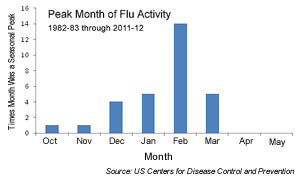Changing Advice: Egg-Allergic Patients Should Get Flu Vaccine Without Delay
DENVER, CO —
New recommendations from a task force of allergy experts advise people with an egg allergy to get a flu vaccine, and not to delay with allergy testing before the vaccine. Patients had previously been cautioned about vaccination because of concerns about adverse reactions to egg protein in the vaccine.
“The new approach to patients with an egg allergy is that we now will administer the injectable, inactivated influenza vaccine without any prior testing,” said Mark Boguniewicz, MD, pediatric allergist-immunologist at National Jewish Health in Denver. “Any risk of a reaction to the small amounts of egg protein in vaccines is outweighed by risks posed by the flu.”
The new practice parameters, published in July 2012, were developed through a joint effort of the American Academy of Allergy, Asthma & Immunology, the American College of Allergy, Asthma & Immunology, and the Joint Council of Allergy, Asthma & Immunology.
Boguniewicz also emphasized that it is not too late to get a vaccine this season. The current 2012-2013 flu season has gotten off to a strong start, with serious cases and some deaths reported around the country including in Colorado.
While the average flu season generally begins in December, it does not peak until February and continues into March. Each season has its own profile, and physicians at National Jewish Health are generally offering the vaccine to all their patients who have not yet gotten one, and will do so until infectious disease experts advise them not to.

“I give vaccinations to egg allergic patients almost every day,” said Boguniewicz. “Our experience at National Jewish Health is that flu vaccines can be safely administered even to patients with a history of systemic, anaphylactic reactions.”
Flu vaccines are manufactured by first growing the influenza virus in chicken eggs or cell cultures made from them. As a result, there is some egg protein in all vaccines, which has raised concerns about adverse reactions in patients with egg allergy.
Previous recommendations from this task force, published in 2009, recommended a more involved and cautionary procedure, involving allergy skin tests and divided doses. The new guidelines offer a more streamlined procedure, intended to protect more egg-allergic patients from the flu. Skin testing is no longer recommended prior to vaccination, and neither is a dose divided into two smaller fractions.
Patients with a history of allergic reactions to eggs are advised to get an injectable inactivated virus vaccine, rather than the nasal vaccine containing a weakened, but live virus. Patients should get the vaccine only at facilities experienced and equipped to recognize and treat an anaphylactic reactions. Those patients are also advised to remain at the facility for 30 minutes to be observed for possible allergic reactions.
“We have found flu vaccines to be safe in the overwhelming majority of our egg-allergic patients,” said Dr. Boguniewicz. There does, however, remain a small chance of a severe reaction. “I tell my patients that since it is unpredictable, let’s do it in a safe environment.”
National Jewish Health is the leading respiratory hospital in the nation. Founded 125 years ago as a nonprofit hospital, National Jewish Health today is the only facility in the world dedicated exclusively to groundbreaking medical research and treatment of children and adults with respiratory, cardiac, immune and related disorders. Patients and families come to National Jewish Health from around the world to receive cutting-edge, comprehensive, coordinated care. To learn more, visit the media resources page.Media Resources
We have many faculty members, from bench scientists to clinicians, who can speak on almost any aspect of respiratory, immune, cardiac and gastrointestinal disease as well as lung cancer and basic immunology.
Media Contacts
Our team is available to arrange interviews, discuss events and story ideas.
- Adam Dormuth
303.398.1002 office
970.222.5034 mobile
dormutha@njhealth.org - Jessica Berry
303.398.1082 office
303.807.9491 mobile
berryj@njhealth.org
